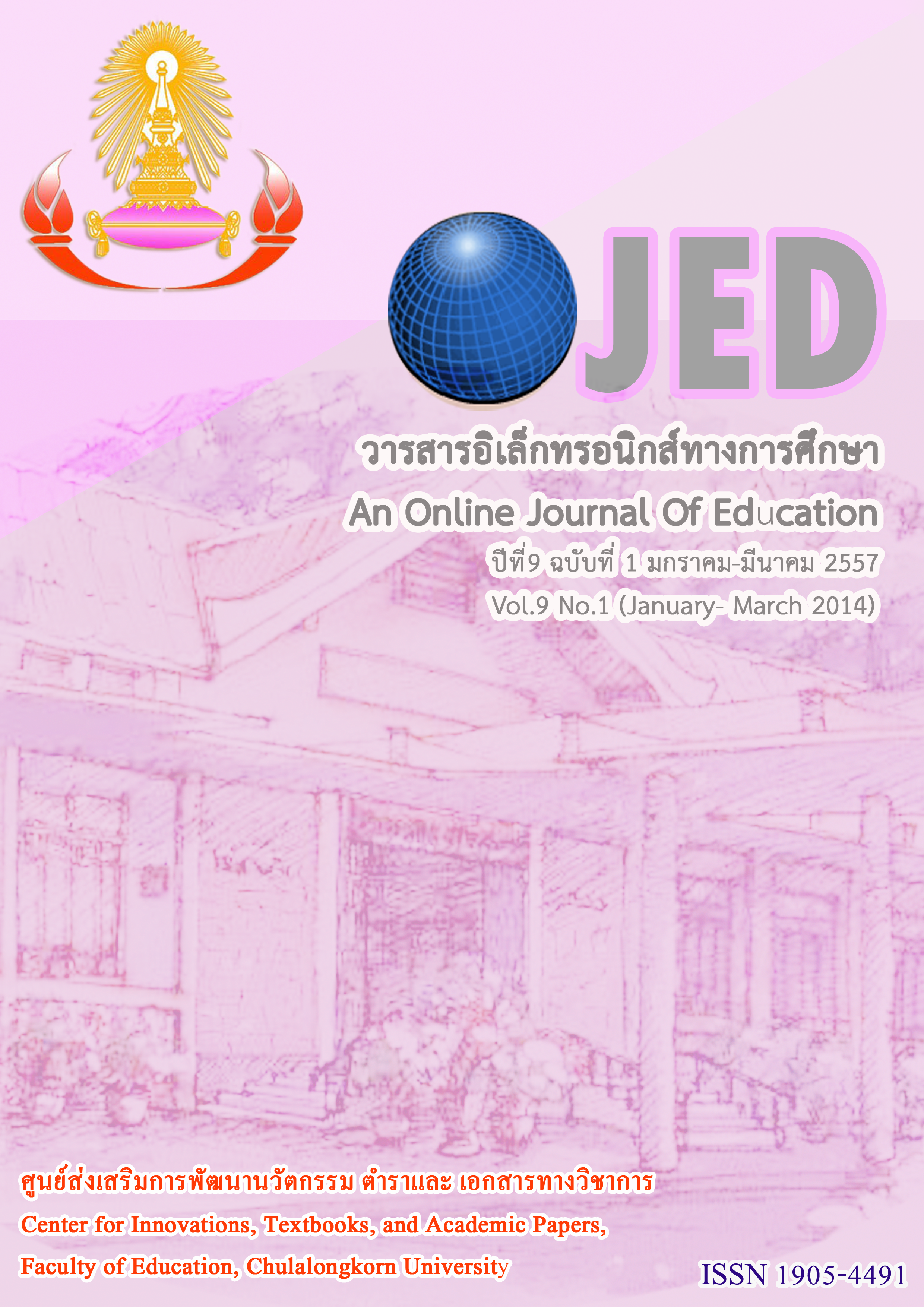ผลกระทบของการทดสอบทางการศึกษาระดับชาติขั้นพื้นฐานที่มีต่อการเรียนภาษาอังกฤษตามการรับรู้ของนักเรียนชั้นมัธยมศึกษาปีที่ 3
Keywords:
ผลกระทบของการสอบ/การทดสอบทางการศึกษาระดับชาติขั้นพื้นฐาน, การเรียนภาษาอังกฤษ, WASHBACK, THE O-NET, ENGLISH LANGUAGE LEARNINGAbstract
การวิจัยนี้มีวัตถุประสงค์เพื่อ (1) ศึกษาผลกระทบของการทดสอบทางการศึกษาระดับชาติขั้นพื้นฐานที่มีต่อการเรียนภาษาอังกฤษตามการรับรู้ของนักเรียนชั้นมัธยมศึกษาปีที่ 3 (2) ศึกษาความคิดเห็นของนักเรียนชั้นมัธยมศึกษาปีที่ 3 ที่มีต่อการทดสอบทางการศึกษาระดับชาติขั้นพื้นฐาน กลุ่มประชากรคือ นักเรียนระดับชั้นมัธยมศึกษาปีที่3 สังกัดสำนักงานเขตพื้นที่การศึกษามัธยมศึกษา เขต6 จังหวัดฉะเชิงเทรา ในปีการศึกษา2556 กลุ่มตัวอย่างคือ นักเรียนระดับชั้นมัธยมศึกษาปีที่ 3 จำนวน 400 คนในงานวิจัยเชิงปริมาณ และนักเรียนระดับชั้นมัธยมศึกษาปีที่ 3 จำนวน 60 คนในงานวิจัยเชิงคุณภาพ เครื่องมือที่ใช้ในการวิจัย ได้แก่ แบบสอบถามและแบบสัมภาษณ์แบบมีโครงสร้าง สถิติที่ใช้ในการวิเคราะห์ข้อมูลคือ สถิติเชิงบรรยายและการวิเคราะห์เนื้อหา
ผลการวิจัยพบว่า (1) ในด้านเนื้อหาที่เรียน เวลาที่ใช้ในการเรียนและแรงจูงใจในการเรียน นักเรียนสนใจเรียนทักษะการสื่อสารเป็นประจำและใช้เวลาส่วนใหญ่เพื่อฝึกทักษะการสื่อสารในชั้นเรียนเป็นบางครั้ง นอกจากนี้นักเรียนเรียนภาษาอังกฤษเพิ่มขึ้นเพื่อพัฒนาความสามารถในการใช้ภาษาอังกฤษเป็นบางครั้ง ในด้านกลยุทธ์ที่ใช้ในการเรียนและความรู้สึกวิตกกังวลในการสอบ นักเรียนส่วนใหญ่ใช้ทักษะการจำเป็นกลยุทธ์ที่ใช้ในการเรียนเป็นบางครั้งและรู้สึกกลัวว่าจะได้คะแนนสอบโอเน็ตต่ำเป็นประจำ (2) นักเรียนส่วนใหญ่เห็นด้วยกับการสอบโอเน็ตที่ใช้วัดความสามารถทางภาษาอังกฤษและเนื้อหาในข้อสอบเน้นทักษะการคิดวิเคราะห์ อย่างไรก็ตามนักเรียนส่วนใหญ่ไม่แน่ใจว่าเนื้อหาในข้อสอบออกตรงตามเนื้อหาในหนังสือเรียน
The study aimed (1) to investigate the extent to which the O-NET have any washback effects on English language learning as perceived by Grade 9 students and (2) to explore students’ opinions towards the O-NET. The population was Grade 9 students in the Secondary Educational Service Area Office 6 in Chachoengsao province in the academic year 2013. The samples were 400 Grade 9 students for quantitative research and 60 Grade 9 students for qualitative research. The instruments used in this study were questionnaire and structured interview. Data analysis consisted of descriptive statistics and content analysis.
The findings revealed that: (1) In terms of contents of learning, total time of learning, and learning motivation. Grade 9 students often focused learning on communicative skills and spent their time practicing communicative skills in classrooms sometimes. Moreover, they sometimes studied English harder in order to develop their ability to use language. In terms of learning strategies and test anxiety, most of them sometimes used rote-memorization as their learning strategies and often feared for the low O-NET scores. (2) Most of Grade 9 students agreed that the test was used to check their English proficiency, and critical thinking skills were emphasized on the test. However, they were undecided whether the contents of the test were related to the contents of textbooks.




